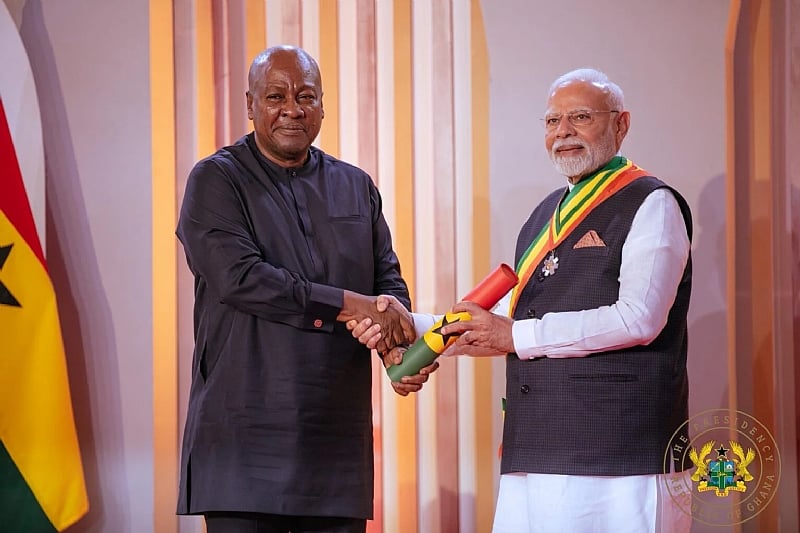Indian Prime Minister Narendra Modi’s two-day state visit to Ghana has ended with what both governments have described as a transformative diplomatic breakthrough, the first by an Indian leader in three decades.
Foreign Minister Samuel Okudzeto Ablakwa, reflecting on the significance of the visit, said it went far beyond ceremonial diplomacy. In a post on X (formerly Twitter) on Saturday, July 5, he declared, “The visit marks a watershed moment in our diplomatic relations.”
Prime Minister Modi, who leads the world’s largest democracy, visited Ghana from July 2 to 3, marking a key turning point in India’s engagement with West Africa. His trip was aimed at solidifying strategic ties and expanding cooperation across trade, technology, security, and health.
Ghana’s presidency described the visit as an affirmation of the “warm and longstanding friendly relations between Ghana and India,” and an expression of the commitment by both nations to deepen their strategic partnership.
According to Mr Ablakwa, ten visionary agreements were signed during the visit, spanning vital sectors of Ghana’s economy and society. These include:
Elevation of Bilateral Relations
“Elevating our bilateral relations to Comprehensive Partnership which makes us special allies for wider and deeper priority cooperation,” Ablakwa said, placing the relationship on a new strategic footing.
Trade Expansion
Both countries agreed to double bilateral trade from $3 billion to $6 billion in the short term, signalling a renewed push toward economic integration.
Africa Vaccine Hub
Leveraging India’s status as the “pharmaceutical headquarters of the world,” the two sides agreed to position Ghana as “the Vaccine Hub of Africa” in a bid to reduce the continent’s heavy reliance on imports.
“We can change the unacceptable situation where Africa produces only 1% of its vaccine requirements,” Ablakwa noted.
Strategic Defence Pact
A new defense cooperation agreement will strengthen military ties and boost regional security coordination.
Trade Standardization
The two nations committed to aligning trade regulations to facilitate smoother, more predictable exchanges.
Medicines Research Institute at UHAS
India will partner with Ghana to establish a “world-class Institute for Medicines at the University of Health and Allied Sciences (UHAS),” further supporting public health and pharmaceutical research.
Agricultural Modernization
The two countries will collaborate on farming innovation and food security under an enhanced agricultural cooperation framework.
Digital Technologies and Innovation
Recognizing India’s global dominance in the digital economy — with 50% of global digital transactions — the countries will collaborate on digital innovation, supporting President Mahama’s “One Million Coders Initiative,” fintech promotion, and the national Innovation Hub.
Renewable Energy Collaboration
Ghana will benefit from renewable energy partnerships under India’s International Solar Alliance framework.
Creative Arts and Cultural Exchange
A new agreement will promote deeper collaboration in culture and the arts, boosting creative industries in both countries.
The agreements underscore Ghana’s ambition to reposition itself as a regional powerhouse in technology, healthcare, trade, and innovation — and India’s intention to expand its influence and partnerships in Africa.
Prime Minister Modi’s visit was not only historic in timing, but also in the depth of outcomes, signalling what officials on both sides are calling the beginning of a new strategic era.


